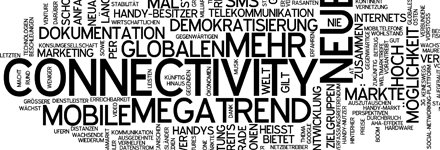
Business in 2020 – although only six years away – will look quite different to what we know today. And connectivity will be at the heart of this change. Consumers are increasingly living their lives via their smartphone – from online shopping, to streaming video content, to connecting with businesses, family and friends.
While many businesses are moving ahead with strategies to take advantage of new technology and unprecedented levels of connectivity, others are at risk of being left behind.
We use the concept “Ready Business” to help businesses make sense of the technology trends that are shaping not just our workplace, but the world around us.
Not just about going digital
“Over the next six years, businesses face increasing volumes of data, connecting remote workforces and managing demands for workers to Bring their Own Device (BYOD). Some of the biggest inhibitors to business can be outdated policies. We believe a Ready Business is more than just going digital, but where mobility is at the core of everything.
When Kiwi company Events Direct began in 1995, things moved at a slower pace, with communications via fax and the phone. Fast-forward to today and the team spends more than 70% of its time on the road, creating exhibition stands for blue chip companies. And everything is done by smartphone.
The team use smartphones to check manuals, and step-by-step videos on YouTube. Artwork files, videos and presentation can be stored online and accessed when they are required.
Connecting billions of objects
Connecting employees and managing your workforce is one thing; technology pundits believe we are on the threshold of a profound technology shift where billions of objects will be connected.
Cue the buzz around the so-called Internet of Things (of which M2M is a part), where objects previously dumb are made smart by being connected to each other. Technology analyst Frost & Sullivan identifies connectivity and convergence as one of the most interesting developments in its report, World’s Top Global Mega Trends to 2025.
It values the Internet of Things to be worth US$731 billion by 2020, with the smart city comprising more than half of that (smart cities is the concept where everything is connected, from the garbage to lighting to public transport). In New Zealand, Christchurch appears like it will have elements of a smart city, as it considers things like a network of sensors to provide a host of data about how the city is performing.
So what does this mean for kiwi businesses strategy? Removing the barriers to technology adoption and thinking about how your business could take advantage of these trends is a key step towards becoming a “Ready Business”.
All of these new innovations in technology can help give competitive advantage. Ultimately, the advent of faster networks, the avalanche of connectivity, the availability of more data means consumer expectations are likely to increase. The question for your business is: “Are you ready?”
The writer is Vodafone’s Head of Enterprise. Vodafone teamed up with Nokia to ruminate on the future of business this week (Sep 23, 2014), finishing off with nibbles and wine.
 ?
?




